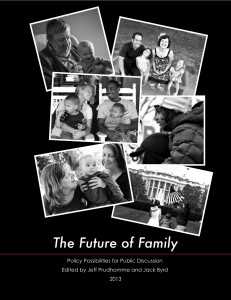In 2014, The Interactivity Foundation published the 40-page Discussion Guide, What Might Childhood Look Like in the Future? A Discussion Guide For Exploring Possibilities for Public Policy, which came from discussions between 2011 and 2012, that were then reviewed, tested and revised, before publishing.
Whitney Houston sings in The Greatest Love of All (1985) that “the children are our future”. What, though, is the future of childhood? What does it mean, in our society, to be a child- or to have a childhood? And what might it mean in the future? Looking back, it may be easy to presume that children have always enjoyed the protected status that they officially seem to have within modern American society. But both the historical and modern realities of childhood greatly complicate this picture and many of our associated ideals.
Perhaps we need to rethink what childhood might look like in the 21st century. This project will ask some difficult questions and consider multiple. alternative answers.
For example:
- How might we address broader social issues directly affecting childhood such as homelessness, abuse, neglect, crime, violence- whether on the streets or in their homes and at the hand of a parent or caregiver?
- How do we best raise children who will be competent enough to navigate the complexities of our modern world? What traits will they need?
- Are there ways to build and develop our supporting villages that will both more supportive and less threatening to parents and caregivers?
- What other issues might affect children growing up 20, 30, or 40 years from now?
The PDF version of this report is available for download here.
About the Interactivity Foundation
The Interactivity Foundation is a non-profit, non-partisan organization that works to enhance the process and expand the scope of our public discussions through facilitated small-group discussion of multiple and contrasting possibilities. The Foundation does not engage in political advocacy for itself, any other organization or group, or on behalf of any of the policy possibilities described in its discussion guidebooks. For more information, see the Foundation’s website at www.interactivityfoundation.org.
Follow on Twitter: @IFTalks.
Resource Link: www.interactivityfoundation.org/discussions/the-future-of-childhood


 By all accounts, America is a nation of substance users. More than two-thirds of us are taking at least one prescription drug, and more than half drink alcohol on a regular basis. Marijuana consumption is on the rise as more states relax their laws on its medicinal and recreational use. But even legal substances, when misused, can result in serious problems. Beyond the human suffering, the abuse of legal and illicit substances is costing the nation more than $400 billion dollars each year due to lost productivity, health problems, and crime.
By all accounts, America is a nation of substance users. More than two-thirds of us are taking at least one prescription drug, and more than half drink alcohol on a regular basis. Marijuana consumption is on the rise as more states relax their laws on its medicinal and recreational use. But even legal substances, when misused, can result in serious problems. Beyond the human suffering, the abuse of legal and illicit substances is costing the nation more than $400 billion dollars each year due to lost productivity, health problems, and crime. More about the NIFI Issue Guides
More about the NIFI Issue Guides

 The easy-to-use, 40-page guide frames the possibilities that discussion participants can consider in two categories. The first, “Setting the Stage,” focuses on immediately impact awareness and action, and the second, “Meeting the Continuing Climate Challenge,” is focused on the more complicated, long-term approaches needed to impact infrastructure and natural systems.
The easy-to-use, 40-page guide frames the possibilities that discussion participants can consider in two categories. The first, “Setting the Stage,” focuses on immediately impact awareness and action, and the second, “Meeting the Continuing Climate Challenge,” is focused on the more complicated, long-term approaches needed to impact infrastructure and natural systems. The five policy possibilities are:
The five policy possibilities are: Edited by IF Fellow Jeff Prudhomme and the Interactivity Foundation’s president Jack Byrd, Jr., this guidebook asks readers to consider how public policy might respond to these concerns. It invites readers to explore and discuss what values or moral considerations shape these policies? What are the rights and responsibilities in regard to the family that public policy should take into account? How should we approach the relationship between political power and the family? What are other moral, legal, or political concerns that our family policies might need to address?
Edited by IF Fellow Jeff Prudhomme and the Interactivity Foundation’s president Jack Byrd, Jr., this guidebook asks readers to consider how public policy might respond to these concerns. It invites readers to explore and discuss what values or moral considerations shape these policies? What are the rights and responsibilities in regard to the family that public policy should take into account? How should we approach the relationship between political power and the family? What are other moral, legal, or political concerns that our family policies might need to address?

 Test discussions facilitated by former Wisconsinites in Tucson, Ariz., and in Sonora and Mazatlan, Mexico, further developed the text of the discussion guide.
Test discussions facilitated by former Wisconsinites in Tucson, Ariz., and in Sonora and Mazatlan, Mexico, further developed the text of the discussion guide.